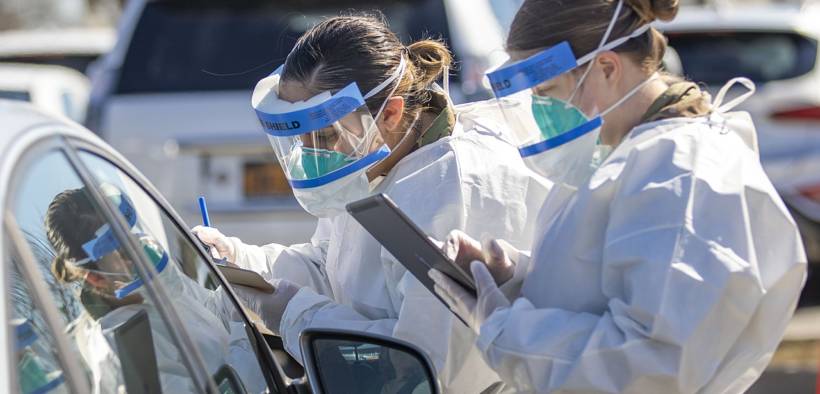Is it OK to Pick A Scab?

What happens when a scab is picked off a wound? What are we seeing on the wounded body of America that has been revealed by its uncovering caused by the coronavirus pandemic?
The open wound that is America in 2020 reveals myriad causes of our poor health as a society.
Exposed now for all to see are these symptoms of a seriously sick nation:
1. 1. The international response to the Covid 19 pandemic has laid bare the reality that America was less prepared for a pandemic than countries with universal health systems. Ignoring multiple forecasts of the pandemic by the Trump administration exacerbated our unpreparedness. Even before the crisis began, the United States had fewer doctors and fewer hospital beds per capita than most other developed countries. Hospitals and health care have become profit, not people driven. The United States currently ranks highest in healthcare spending among the developed nations of the world.
2. Revolting examples of growing financial inequality in the U.S. have shown us how the super wealthy can flee the cities and “weather the Covid 19 storm” at their second homes in the country and hundreds of yachts in the Caribbean. Income inequality in the U.S. is the highest of all the G7 nations, according to data from the Organization for Economic Cooperation and Development. The wealth gap between America’s richest and poorer families has more than doubled from 1989 to 2016. Over the last 30 years, wage inequality in the United States has increased substantially, with the overall level of inequality now approaching the extreme level that prevailed prior to the Great Depression.
3. Cultural bias and racism has expanded exponentially under the present administration and given a boost during the pandemic. In a time when we might expect people to come together in unity, stories of racial animosity are increasingly common no thanks to a racist White House. The Asian Pacific Policy and Planning Council currently receives almost 100 reports per day of hate crimes against Asian Americans prompted by the conservative “strategy” of accusing China for the coronavirus pandemic. President Trump has finally decided he will stop using the term “Chinese virus” but the damage has been done. Perhaps unsurprisingly, white supremacists quickly mobilized and promulgated conspiracy theories blaming the coronavirus on Jews, Asians, Muslims and immigrants. They expressed their hope that the virus would target minority groups. Meanwhile, haredi and Orthodox Jewish communities have faced scapegoating and blame for spreading the virus.
4. Times of social, political, and economic stress present opportunities for corruption – and the crisis caused by the novel coronavirus has been no exception. As the United States ramps up its coronavirus-related procurement, lessons learned in health-sector corruption elsewhere show that procurement and contracting malfeasance have led to deadly consequences – inflated prices and/or poor-quality goods at the expense of Covid 19 patients and over-stressed healthcare workers. Hospital systems have been forced to buy N 95 masks from Mexico for $7 each that normally cost 58 cents. The fast-spreading coronavirus pushed up prices on hand sanitizer and surgical face masks by at least 50% on Amazon. Consumers are paying the price. According to a report by the U.S. Public Interest Research Group, the sky-high prices weren’t isolated to third-party sellers. While Amazon has said it was cracking down on price gouging on its vast online shelves, the retail giant was marking up prices, too, the report found.
It may feel like wrong advice, but research shows it can be OK to pick a scab. Picking can actually help the healing process because a scab that’s on for too long increases scarring. The question now is whether or not we the people can somehow cause our leaders to truly heal our sick nation.
That said, the worst-case coronavirus scenario is not the mass deaths it is causing. It is that people are being led to accept mass death – to accept that someone will die in the U.S. every 30 seconds as “just how it is.” That is the conservative rationale now being sold to us.
Newly leaked projections from the Trump administration predict a second wave of Covid-19 is likely right in early Fall. By June 1, the country could see 3,000 deaths a day – a new high – along with hundreds of thousands of new cases. The estimates come as parts of the country are beginning to reopen businesses and ease restrictions on distancing.
In a Fox News (where else?) interview, President Donald Trump once again called for states to reopen sooner than later. At the same time, he cast aside earlier projections lauded by his own administration that predicted the U.S. would see at most 60,000 deaths by the end of August. Instead, he conceded that “we’re going to lose anywhere from 75,000, 80,000 to 100,000 people.” This is a horrendous forecast from any perspective. But the Trump administration and its backers from conservative media to the small but aggressive “reopen” movement are trying to convince people it’s not only “normal” but worth it.
They are working to avoid a worse scenario – the needless deaths of thousands of Americans – on its head by arguing that we must embrace it straight on and just plow forward with reopening the country. This is a criminally caustic idea in this moment because it is also establishing a dangerous political precedent. It is setting Americans up to reject legitimate policy solutions on what remains unarguably the biggest issue facing humankind: the climate crisis. Our apparent inability to demand more from our leaders and each other is risking the larger catastrophe that will follow the Covid 19 pandemic. It is a global catastrophe that will, over time, make the open wound that is America today seem like a surface scratch.
Today, in the narrow view of the “reopen” protesters, freedom means the government should play no role in protecting the greater good, that you don’t owe your fellow humans anything, that being able to get a Big Mac without wearing a mask is an essential expression of liberty and worth 3,000 people losing their lives. It also reveals some kind of magical thinking that you or a loved one will escape being one of the 3,000 people that will die.
It is an expression of the conservative view that values individualism over the public good. A “reopen” protester will argue that that the government should get out of the way and allow anyone who wants to go back to work, or to the store, gym or swimming pool to do just that. Anyone who is afraid of getting Covid-19 can just stay home.
“The reopen movement,” Brian Kahn, Managing Editor of Earther writes, provides the cover for “politicians to ignore the science and popular will to enact shortsighted policies – and throw up their hands when more people get sick and die. It also gives us a preview of how some people and leaders will respond to the steps necessary to address climate change, which will require similar bold actions that will upend the status quo.”
Case in point is a recent story in Forbes Magazine by Jeff McMahon that began with this: “The coronavirus lockdown likely has caused the largest single-year drop in carbon emissions ever recorded, but according to a new analysis, it achieved that silver lining at the expense of a lot of gold. ‘While lower CO2 emissions are nominally a good thing, the cost of achieving them will be astronomical,’ according to the analysis from The Breakthrough Institute.”
“We calculate that each ton of carbon reduced in 2020 will come at the cost of $1,750 in reduced economic activity,” writes Zeke Hausfather, BTI’s director of climate and energy – “a cost more than an order of magnitude higher than clean energy technologies available today.”
“CO2 emissions may increase again in 2021,” Hausfather said, “at least in scenarios where new major outbreaks do not occur – but emissions will likely remain below pre-crisis levels.”
The Breakthrough Institute’s mission statement includes this statement: “We believe that ecological vibrancy results from human prosperity, not the other way around. Meeting people’s material needs is both an ethical imperative and a pre-condition for societal concern about nature. Technological innovation, particularly in energy and agriculture, can enable us to both meet human needs and reduce our reliance on natural resources. And clean energy technologies are key to creating a high-energy planet without overheating the climate.”
Breakthrough’s position that technology can mitigate carbon emissions ignores other fundamental causes of our environmental woes. Other contributors include methane gas released from landfills, natural gas and petroleum industries, and agriculture, factory farms (especially from the digestive systems of grazing animals); nitrous oxide from fertilizers; gases used for refrigeration and industrial processes; and the massive loss of forests that would otherwise store CO2.
Bottom line is that global warming is the result of how we live on this earth. From the overuse of fertilizers to the mountains of trash accumulated by a throwaway culture and shipped to other countries we are a wasteful society. Technology is but one component in a mix of systemic changes that is necessary to bring down the carbon emissions that are slowing killing us.
Most critical is the essential necessity of revamping our unregulated capitalist economy into a sustainable economic system. The present demand for constant growth is killing our planet.
Then there is the impact of global warming on the spread of such mosquito-borne diseases as malaria and the 2016 resurgence of the Zika virus. In an interview on Face the Nation, Dr. Diarmid Campbell-Lendrum, Head of the Climate Change and Health Program at the World Health Organization, said that air pollution “is one of the severest problems that we face around the world.”
Air pollution increases the risk of other illnesses like heart disease and respiratory issues, something that has had a direct impact on those suffering during the coronavirus outbreak. About one in eight deaths around the world is caused by air pollution. Dr. Campbell-Lendrum noted that while climate change did not cause coronavirus, “if we want to reduce the chances of the next pandemic, then we have to start taking more care of the natural environment.”
“The best available science,” Earther’s Brian Kahn wrote, “tells us drawing down emissions rapidly this decade is our best shot at protecting the climate and humanity. Even then, people will still die, and we should absolutely mourn that fact. But more than that, we should be mad as hell that fossil fuel companies and pliant politicians have made that the best case scenario while also doing their damnedest to ensure we don’t even get that.”
That we must reopen the U.S. in the face of the coronavirus risks is as hollow as thinking we can do nothing about carbon emissions. The results will be the same: needless death in the service of selfishness. In the case of the climate crisis, that death will be so much more widespread, encompassing the entire biosphere that has made it possible for humanity to thrive.
With no vaccine on the immediate horizon, a cratering economy, and a rudderless government haphazardly doling out paltry relief funds, these are terrifying times. The climate crisis is challenging us by requiring that we think completely differently about the way we live on our planet. And to embrace the new sociopolitical construct we must redesign in order to survive. It does not exist in this present moment. But neither did the coronavirus last January. How we get through Covid 19 will provide a template for what we will have to do to survive our climate crisis. Mass death by inaction in the service of a killer economy is simply not acceptable.
Is it?







